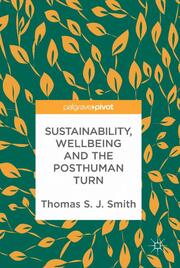Detailansicht
Sustainability, Wellbeing and the Posthuman Turn
Contested Conceptions and New Foundations
ISBN/EAN: 9783319940779
Umbreit-Nr.: 5151123
Sprache:
Englisch
Umfang: vii, 93 S.
Format in cm:
Einband:
gebundenes Buch
Erschienen am 20.07.2018
Auflage: 1/2019
- Zusatztext
- This book examines how the way we conceive of, or measure, the environment changes the way we interact with it. Thomas Smith posits that environmentalism and sustainable development have become increasingly post-political, characterised by abstraction, and quantification to an unprecedented extent. As such, the book argues that our ways of measuring both the environment, such as through sustainability metrics like footprints and Payments for Ecosystem Services, and society, through gross domestic product and wellbeing measures, play a constitutive and problematic role in how we conceive of ourselves in the world. Subsequently, as the quantified environmental approach drives a dualistic wedge between the human and non-human realms, in its final section the book puts forward recent developments in new materialism and feminist ethics of care as providing practical ways of re-founding sustainable development in a way that firmly acknowledges human-ecological relations. This book will be an invaluable reference for scholars and students in the fields of human geography, political ecology, and environmental sociology.
- Kurztext
- This book examines how the way we conceive of, or measure, the environment changes the way we interact with it. Thomas Smith posits that environmentalism and sustainable development have become increasingly post-political, characterised by abstraction, and quantification to an unprecedented extent. As such, the book argues that our ways of measuring both the environment, such as through sustainability metrics like footprints and Payments for Ecosystem Services, and society, through gross domestic product and wellbeing measures, play a constitutive and problematic role in how we conceive of ourselves in the world.Subsequently, as the quantified environmental approach drives a dualistic wedge between the human and non-human realms, in its final section the book puts forward recent developments in new materialism and feminist ethics of care as providing practical ways of re-founding sustainable development in a way that firmly acknowledges human-ecological relations. This book will be an invaluable reference for scholars and students in the fields of human geography, political ecology, and environmental sociology.
- Autorenportrait
- Thomas S.J. Smith received his PhD in the School of Geography and Sustainable Development at the University of St Andrews, Scotland. He is also an editor at the Dark Mountain Project, an environmental literary initiative which gathers writers, poets, and artists who are interested in challenging the conventional narratives of civilisation.
